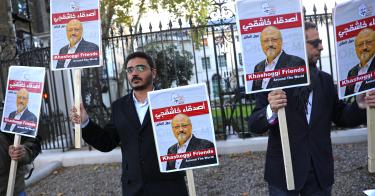As part of the reaction to the murder of Jamal Khashoggi, and as part of the wider left-wing preference for siding with Iran instead of Saudi Arabia, progressives who were already thoroughly in favor of the Arms Trade Treaty (ATT) are arguing that Western governments should ratify it, or uphold it, in order to cut off arms sales to the Saudis. This is a terrible argument.
First, the ATT isn’t an answer that its advocates have arrived at out of the blue. It’s long been their stock response to virtually anything in U.S. or Western foreign policy that they find distasteful. They particularly disliked U.S. support for and arms sales to Saudi Arabia – partly because, as progressives, they focus almost exclusively on the purported evils of the West, partly because they follow former President Obama in his foolhardy belief that Iran will be a constructive actor if only we are nice to it, and partly because they are born ambulance chasers. Their view is that, if it bleeds, it leads. That made the profitless Saudi war in Yemen a natural focus for their activism. The Saudi murder of Khashoggi has just given them another opportunity to push the bad idea they have been pushing for years.
Second, backing the ATT because you dislike U.S. (or British, or French, or Canadian) arms sales to the Saudis is like going into a restaurant and ordering everything on the menu because you want the salad. U.S. arms sales to the Saudis are a policy. It might be a good policy, or it might be a bad policy – or it might be a bad policy that is nonetheless better than the alternatives. But it is nonetheless just a policy. The ATT, on the other hand, is not a policy: it is a treaty. By signing onto it, you are not simply responding to the Khashoggi murder, or to the Yemen war: you are committing yourself to following the treaty’s rules in all future circumstances. You are ordering the whole menu for the sake of the salad.
Third, if the ATT had existed over the previous decades, and was interpreted as tightly as its advocates appear to demand, it would have imperiled a lot of U.S. arms transfers that almost everyone would today regard as sensible and justifiable. U.S. military aid to Britain before the U.S. entered the Second World War would be dubiously legal under the ATT, because the British bombing campaign against Nazi Germany inflicted a lot more civilian casualties than the Saudis have in Yemen. Same for U.S. military aid to South Korea. Same for U.S. arms supplies to Bosnian Muslims resisting Serbian aggression in the 1990s. Same for U.S. arms supplies to rebels resisting the murderous Assad regime in Syria.
Fourth, it is entirely possible that the U.S., British, and French arms sales to the Saudis are in fact permissible under the ATT. That was the decision of the British High Court in 2017, and while that decision was not a slam dunk, it implies that the ATT is so loose that it does not actually ban much of anything. So the ATT is the worst of all worlds: it might ban nothing at all, or it might ban a lot of things, or it might just ban things that become unpopular with the left. In practice, therefore, it’s not a treaty: it’s a political mechanism for achieving particular outcomes, which is precisely how it’s being used today. Funny – I thought the left was concerned about the fate of the liberal international order. Well, treaties that act like treaties – in other words, that are agreed, predictable, and enforced – are part of that order. But in practice, the left is entirely willing to ditch the order for the sake of getting what it wants.
The bottom line is this: if you don’t like U.S. arms sales to the Saudis, campaign to change the policy. I don’t agree with you, but this is a reasonable thing to argue about. But don’t try to change the policy by committing the U.S. – or any other nation – to a set of rules that might mean everything, or nothing, or some things at some times and other things at others. That isn’t being responsible. It’s creating an instrument that, sooner or later, is going to be used to constrain U.S. policy in ways that will make it harder for us to help people who deserve and need our help. In other words, it is profoundly irresponsible.
This piece originally appeared in Forbes https://www.forbes.com/sites/tedbromund/2018/10/31/why-the-arms-trade-treaty-is-no-answer-for-the-saudi-problem/#61f5703d1a7a



